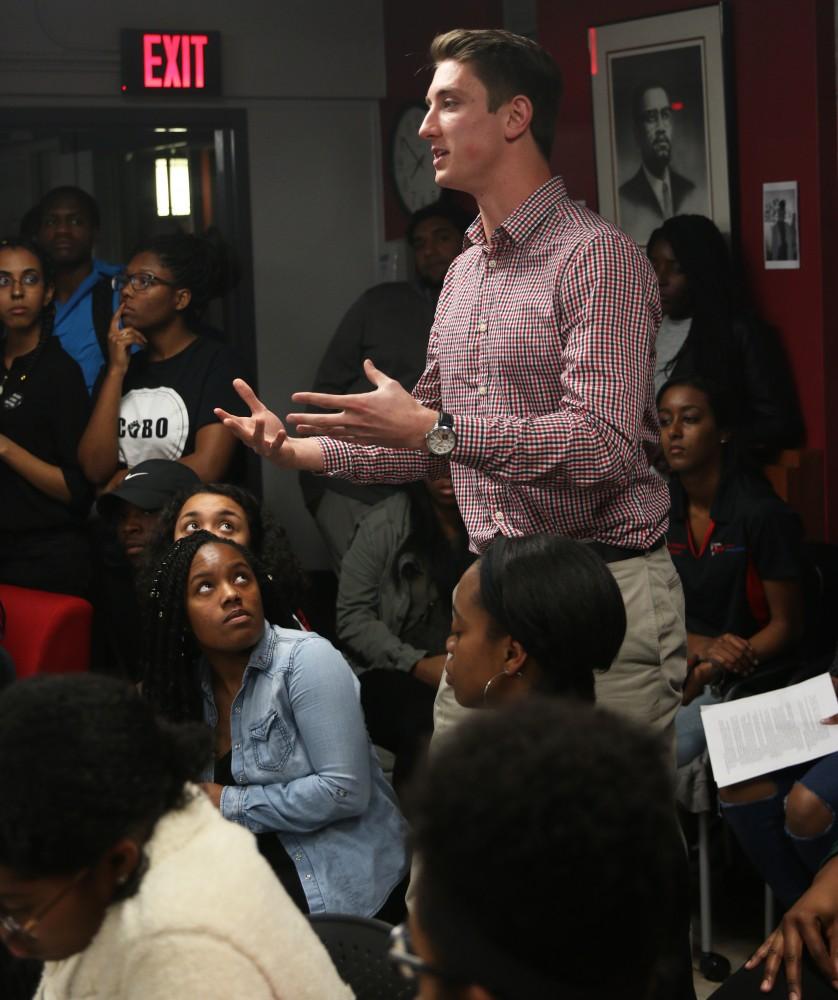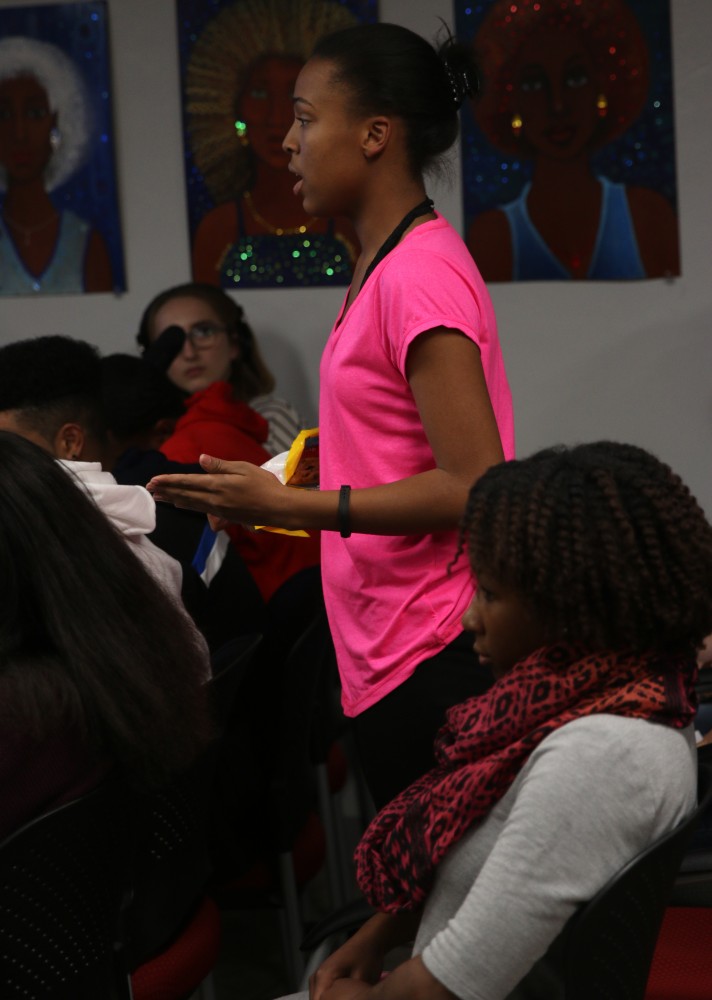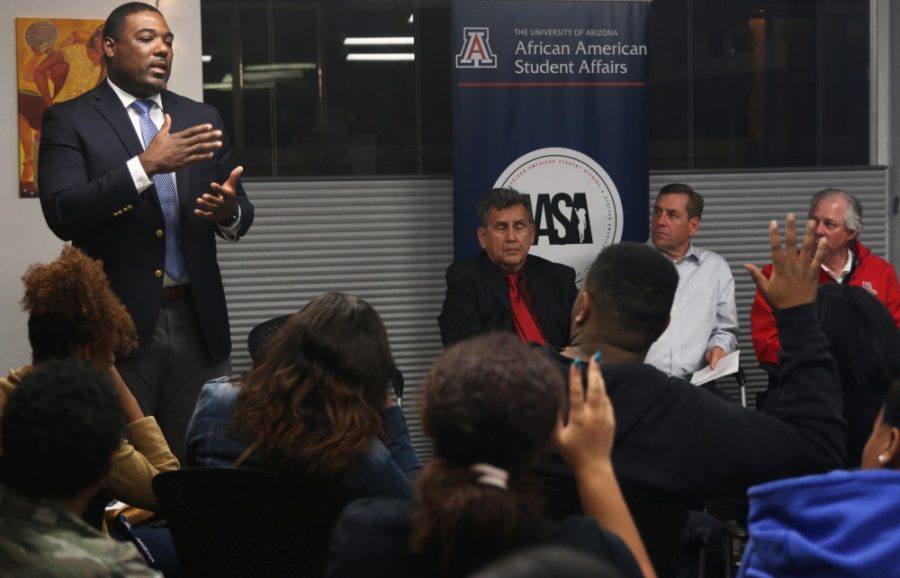A meeting between black students and university administration led to the revelation that a whole theme-community was displaced prior to the start of winter break. University of Arizona President Dr. Robert Robbins was unaware of the circumstances, finally learning of the situation during the meeting.
Black Student Union met with Robbins and other university officials on Wednesday, Jan. 24 to discuss issues pertinent to black students at UA.
Thirty minutes before Robbins arrived, BSU President Hasan Farah informed the packed room of attendees that this meeting was “tactical, not emotional.” The briefing from Farah lasted for fifteen minutes.
Minutes before the meeting, Dean of Students Kendal Washington White and Melissa Vito, senior vice president for Student Affairs, Enrollment, and Strategic Initiatives arrived. They were followed by athletic director Dave Heeke and Senior Diversity Officer Jesús Treviño. Daymyen Layne, director of residential education for Housing and Residential Life arrived, the meeting began.
RELATED: African American Student Affairs renovate center under new director
The first topic of the night centered on the creation of a website for the Marginalized Students of the UA to display their demands, followed by discussion about mandatory cultural competency training.
However, the final and most anticipated topic was the moving of the Building Leaders and Creating Knowledg- community from Navajo-Pinal dorm to Kaibab Huachuca.

Matt Lubisch, ASUA student body president, speaks to students from the African American Student Affairs Wednesday Jan. 25 at a meeting with President Robbins and UA administration.
BLACK is a theme-community designed to help black freshman be successful. Its membership is currently 28 students.
Renovations to the Arizona stadium meant that BLACK had to move out of Navajo Pinal — a dorm carved into the stadium — to Kaibab-Huachuca almost one mile east of the stadium.
However, as athletic director Dave Heeke admitted, the impact of renovations on residents was not initially clear.
“I don’t think, truthfully, there was a full understanding of the impact to that end of the stadium,” Heeke said. “That’s not an end of the stadium that we were going to renovate or change in any way because of the living arrangements that were there.”
As project plans pushed renovations farther east, the student population at Navajo-Pinal became more of a concern.

“Then it became ‘OK, there may be noise, there may be inconvenience there,” Heeke said. “Now we need to make sure [that] we respect those people who live there and how they have to go about their day.”
Layne admitted that they were notified about six weeks before winter break that the students of Navajo-Pinal were going to have to move.
BLACK was not made aware of the situation until the end of the winter break, according to a document handed out to attendees before the meeting. The students were told that they would have their belongings moved for them and that their parking permits would be transferred from 6th Street Garage to Tyndall Garage.
Instead, students in BLACK ended up dealing with problems beyond their control.
RELATED: Trust is biggest hang-up at first meeting of new Diversity Task Force
“We barely moved last week,” said Kevin Bishop, a member of BLACK. “The movers’ situation was not organized — CatCards not working, getting charged rent for two places — and it made it seem like they didn’t care for us.”
On the handout, BSU claimed that Layne told a student that moving parking passes “wouldn’t be possible and and it was out of his hands.”
Some students in BLACK were charged to live in both Navajo Pinal and Kaibab-Huachuca despite having to move. Other students were more surprised by what they saw when they moved.
One student claimed that when she and her roommate moved in, the bed was dirty and infested with bugs. Another was surprised to find two people already living in his room.
Robbins admitted that it was his first time hearing about the issue.
“Sadly, this is the first time that I’m hearing about this,” Robbins said.
He was appreciative of learning about what had happened.
“Secondly, I want to apologize for everybody in the university that put you through this,” Robbins continued. “And thirdly, I don’t want to speak for Kevin or anybody else, but I hear you loud and clear and we’ll be talking about money.”
Robbins said he did not know how much money will be in discussion, but that he would look into the issue. According to UA spokesman Chris Sigurdson, all current and former residents of Navajo-Pinal Residence Hall were granted a $1500 dollar credit at the beginning of February due to the inconvenience.
Meanwhile, Layne and Heeke apologized for the inconveniences. Both admitted that better communication could have solved the problem.
Follow Jordan Williams on Twitter









